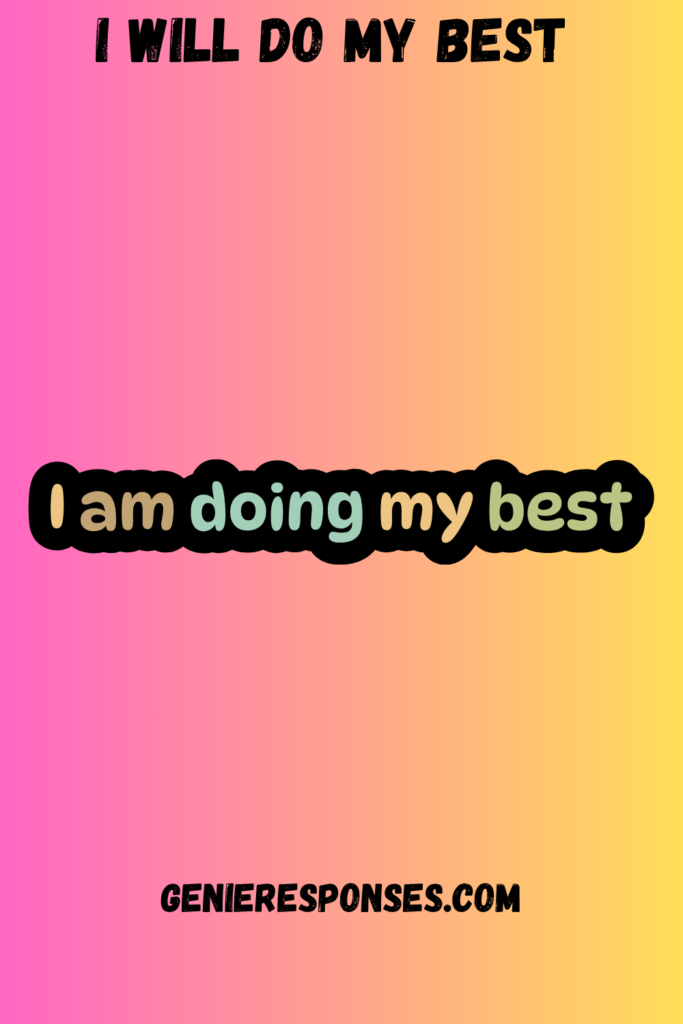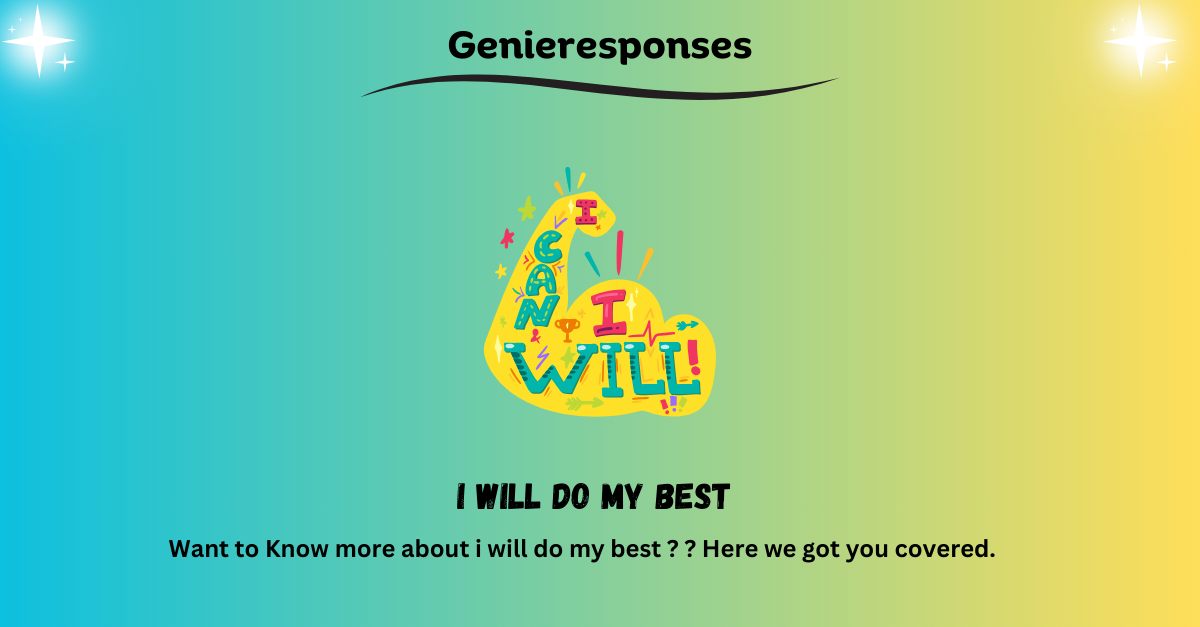In life, there comes a time when we are faced with challenges, opportunities, or simply the need to give our all. It’s during these moments that the phrase “I will do my best” takes center stage, representing a commitment to put forth our utmost effort and dedication. In this blog post, we will explore the significance of this simple yet powerful statement and the impact it can have on our journey to success.
Whether it’s in our personal lives, academics, career, or any other endeavor, the determination to do our best can be a driving force that propels us forward. So, let’s dive into the world of unwavering determination and discover how the mantra “I will do my best” can lead us to remarkable achievements.
Better Ways To Say “I Will Do My Best” To Your Boss
Certainly! It’s always a good idea to express your commitment and enthusiasm in a professional and positive manner when speaking to your boss. Here are some alternatives to saying “I will do my best” that convey a strong work ethic and dedication:
- “I am fully committed to this task and will give it my utmost effort.”
- “You can count on me to put in maximum effort and deliver results.”
- “Rest assured, I will dedicate myself wholeheartedly to the project.”
- “I will go above and beyond to ensure the success of this project.”
- “I’m dedicated to achieving the best possible outcome for this task.”
- “I’m committed to exceeding expectations in completing this assignment.”
- “I’ll pour my energy into making sure this project is a success.”
- “You have my word that I’ll put in every effort to excel in this task.”
- “I’ll spare no effort in accomplishing this task to the best of my abilities.”
- “I’m determined to make this project a success, and I’ll work tirelessly to achieve that.”

How To Say “I Will Do My Best” To Your Boss?
When you want to express your dedication and commitment to your boss by saying “I will do my best,” you can simply state it in a straightforward and sincere manner. Here’s how you can say it:
“I want to assure you that I will do my best to [describe the task or project].”
This approach is clear and professional, and it directly communicates your intent to put in your best effort. It also shows that you are taking the task seriously and are committed to achieving a positive outcome.
“No problem. I will handle it.”
- This response conveys confidence and a willingness to take on the responsibility. It reassures your boss that they can rely on you to manage the task effectively. It also implies that you see the task as manageable and within your capabilities.
“So, when do you want to get it ready?”
- This question demonstrates proactive thinking and a desire to set clear expectations and deadlines. It opens up a discussion about timing and shows that you are ready to plan and prioritize the task according to your boss’s needs.
“Okay, I will let you know when it’s done.”
- This statement reflects a sense of responsibility and accountability. By promising to provide updates on completion, you’re assuring your boss that they won’t need to chase you for progress. It also suggests effective communication and a willingness to keep your boss informed.
“Don’t worry. I’m confident that I can do this. Let’s go.”
- This response not only reassures your boss but also exudes enthusiasm and a “can-do” attitude. It acknowledges their concerns (if any) and confidently asserts your capability to handle the task. The phrase “Let’s go” implies eagerness to start and get the job done.
“Sure, let’s get it done.”
- This is a concise and affirmative response that signals your readiness to take action. It reflects a cooperative and proactive attitude. It’s a straightforward way to convey your commitment to completing the task promptly.
“I’ll give my best to deliver the expected results.”
- This statement combines commitment and the willingness to strive for excellence. It implies that you understand the importance of meeting or exceeding expectations and are dedicated to achieving that. It demonstrates a strong work ethic and a focus on quality outcomes.
In each of these responses, the key is to strike a balance between confidence, responsibility, and a cooperative spirit. Tailoring your response to the specific context and your relationship with your boss is also important for effective communication in the workplace.
Conclusion
In conclusion, the phrase “I will do my best” encapsulates a powerful commitment to excellence and a proactive approach to tackling challenges. It is not merely a promise but a mindset that drives individuals to push their boundaries, embrace opportunities, and strive for success. Whether in the workplace, personal endeavors, or any facet of life, this simple yet profound declaration reflects a determination to rise above obstacles and deliver nothing short of one’s utmost effort. It’s a testament to the resilience and dedication that fuels progress and achievement. So, the next time you find yourself facing a daunting task or embarking on a new journey, remember the strength behind those words and let them propel you toward your goals, knowing that your best effort can yield remarkable results.
Faqs
Faqs about To Say “I Will Do My Best”
FAQ 1: What does it mean to say, “I will do my best”?
Answer: Saying “I will do my best” signifies a commitment to give your utmost effort and dedication to a task or goal. It expresses the intent to perform to the best of your abilities, regardless of challenges.
FAQ 2: How can I ensure I genuinely do my best in a given situation?
Answer: To genuinely do your best, focus on setting clear goals, managing your time effectively, staying organized, seeking help or resources when needed, and maintaining a positive mindset to overcome obstacles.
FAQ 3: Is it always realistic to promise to do one’s best?
Answer: Promising to do your best is about the effort and attitude you bring to a task rather than guaranteeing a specific outcome. It’s a commitment to exert yourself fully, recognizing that external factors may influence results.
FAQ 4: How can I motivate myself to consistently do my best at work or in my personal life?
Answer: Motivation often comes from setting meaningful goals, finding passion in what you do, staying accountable, seeking continuous improvement, and celebrating small successes along the way.
FAQ 5: Are there situations where saying, “I will do my best,” is inappropriate or insufficient?
Answer: While the phrase is generally positive and motivating, there may be instances where specific details, plans, or strategies are needed instead. It’s essential to assess the context and provide appropriate assurances based on the situation.
- ‘She Calls You Daddy’ Meaning: What Does it Signify
- Where Do You Stay Reply: Engage in a Conversation
- First Day at Work: A Memorable Beginning to Your Career Journey
- You Look Like Trouble Meaning: Unraveling Hidden Connotations
- Bachelorette Card: Ideas and Inspiration

